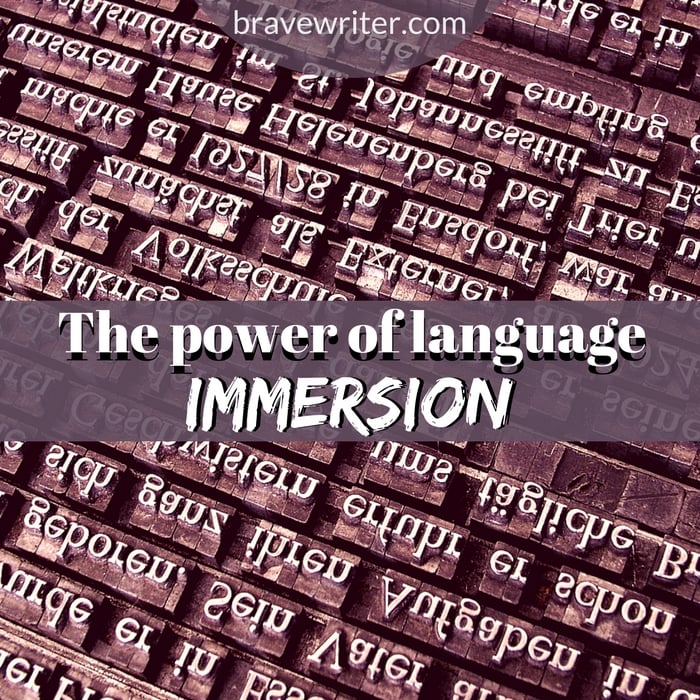The power of language immersion

Keep reading to your kids. Keep talking to them. Keep exposing them to great language (in plays, movies, television, speeches, comedy routines).
There’s a strange thing that happens when you put your children in the context of well-crafted words. They slowly absorb the syntax and cadence of language, the nuanced meanings of words, turns of phrase they can directly download into their own conversations and writing. But this process is slow and the development is mostly imperceptible when your kids are small, or even middling! It may even appear to you that they read all the time, but their writing is still stilted, contrived and impoverished.
The truth is that your kids are growing as writers, but they are internalizing the “sound” of good writing.
They aren’t necessarily analyzing and consciously emulating it. When we focus too much, too soon on teaching them to write with sophistication, structure and flair, we rob them of this important gestation process. They attempt to reach out for words, sentence structures and ideas that they have not yet fully grasped. That leads to stunted insight and vapid analysis. Their energy is sidetracked as they try to think of ways to say things, rather than giving their attention to what they want to say.
Conversely, if you let the formats and structure go for a little while, and instead draw out the insight and imaginative correlations your kids make between the new ideas and their already cached ones, they will begin to search their internal storage unit for language that expresses those ideas. They will focus on the thrill of making connections rather than hunting through cliches and “faux” academic vocabulary.
It is as they forge ties between what they think about and the creative expression of their favorite writers that they develop this mysterious quality called “writer’s voice.” The clarity of insight will find a home in language and style that has become the most comfortable and compelling writing to your child. This meet-up of insight and written expression with flair often begins to show up in about 9th grade. Some natural writers will find themselves already importing the syntax of their favorite writers into their own work at younger ages. Alternatively, a child who has not enjoyed writing or reads less may not make this kind of connection until late high school.
But it will happen.
Kids who read, who spend time actively engaged in language-based environments (and that does include watching well-written movies and television series), do, over time, become able to naturally draw on that reservoir of words and phrases as they do their own writing.
So keep pouring good words into your child’s life. It will pay off. Trust the process.



















Thank you for this encouragement – to trust the process. It can be hard when I don’t see any measureable goals achieved, especially as I or others are tempted to compare my children to schooled children. Reading aloud has been such a joy this school year as my children are all, finally, of an age to listen for a while and engage with the story. I love it when they comment that something in a book is like something else we’ve read or seen, or my 5 year old chips in with what she thinks is going to happen next!
Yes, trust the process! In just a few short years, my 9-year-old VERY reluctant writer has turned into a 17-year-old competent pen-wielder, whose college professors like his analytical skills and his engaging, concise and clear communication on paper. The cherry on top of much whipped cream is that my dear son now considers journalism as a viable career option. Even if he takes a completely different career path, the mere fact that he who started life afflicted with grapho-phobia is actually eyeing a writing career, speaks volumes to the validity of the Bravewriter lifestyle. Don’t you think?
Here is to reading good books and talking and laughing and poetry and good movies and plays and much cuddling and, of course, hot chocolate! ïŠ
Oops…forgot my name on the post above. 🙂